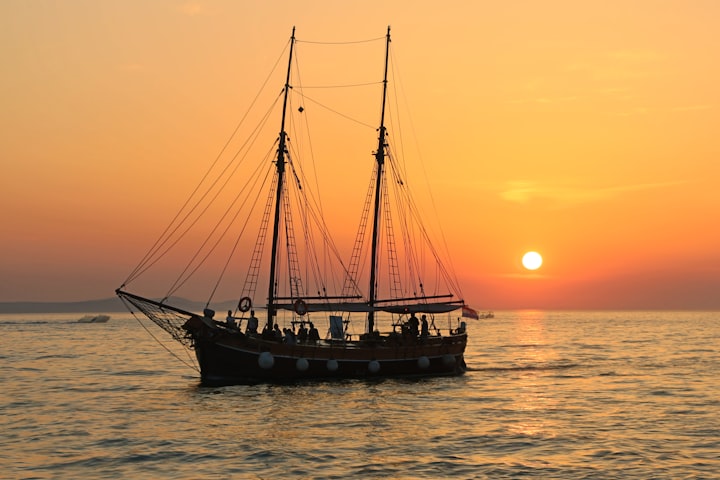The 2021 TikTok Sea Shanty Craze
But what is a sea shanty and where did they originate?

Back in 2019, sea shanties were cast into the mainstream when the movie, Fisherman's Friends was released. Based on a true story, the movie tells the tale of a group of Cornish fishermen from Port Isaac who signed a record deal with Universal Records. The group achieved a top 10 hit with their debut album of traditional sea shanties. Fast forwards to 2021 and sea shanties would again be launched into the limelight by young singers and musicians on the social media app, TikTok.
In February of 2021, 27-year-old former postman Nathan Evans from Airdrie in Scotland reached number three in the UK charts and number one in Germany with his version of the sea shanty, the Wellerman. Since going Viral on TikTok, Evans and his Wellerman rendition have featured on NBC's Saturday Night Live, the BBC One Show and many other prime time TV channels both in the United Kingdom and overseas.
The origin of the word 'sea shanty' has a somewhat murky beginning and the worst is only traceable back to dictionaries from around 1869. One source stated that the word 'shanty' originated from the French word 'chantier', which is a site, year or dockyard. The word also has many subsidiary meanings; including in Canada, it is the name for a log hut built by men engaged in lumbering operations. The word also was used for groups of workmen who were often called 'shantymen'. Another source states that the word means a wooden shack with a shaky door and another book attributes the word to the Irish word 'sean' (old) and 'tight' (house). Lastly, I found a source that gave the origin of the word to the African slave trade, where the word 'shanty' was a house that housed the slaves that were transported to the West Indies. However, the origins as to how the word 'sea shanty' came about is not overly clear. The word also sounds like the English word 'chant' or the French word 'chantez' and so, the word 'sea shanty' could have derived from 'sea chant'.
Despite the origin of the word, rhythmic music to work or rowing can be dated back thousands of years to the Greek God Orpheus 'father of songs', who set chants to the rhythm of rowers.
Herodotus and Thucydides add weight to the ancient roots if not precisely of the shanty, then certainly the shantyman, whose job was to lead and synchronise sailors through song. (The Spectator Ltd, Vol. 345, Issue 10041,Feb. 6, 2021)
Gerry Smyth, the author of the newly published Sailor Song, notes that sea shanties were a phenomenon of merchant ships with work rhythms. The simple melodies of the songs were set to the rhythm of specific work onboard ships from rowing, raising the anchors, to raising the sails. Perhaps, until recently, the most famous shanty of them all, the Drunken Sailor was sung to those specific work tasks, Wey hey and up she rises, men would sing in unison as they hoisted the sails or raised the anchor.
According to the website Songfacts®, the Drunken Sailor is perhaps the oldest known Anglo-Saxon sea shanty. It was originally sung by Indiamen (a ship engaged in trade with India or the East or West Indies) of the Honorable John Company. The song was allegedly the only song that the Royal Navy allowed its crew members to sing on board.
One of my favourite songs, which is not necessarily a sea shanty, My Mother Told Me, can be dated back to somewhere between 1000–1200 and is an old Norse song. The song gained some popularity when it featured on the TV series Vikings S04E09. However, more recently, it has gained popularity in the mainstream after TikTok star natidreddd posted her version of the song on the social media site.
The origins of the song seem to have been written as a poem and were published by Viking warrior-poet Egil Skallagrimsson in Egil's Saga.
Original Version
Þat mælti mín móðir, at mér skyldi kaupa fara á brott með víkingum, fley ok fagrar árar, fara á brott með víkingum, fara á brott með víkingum, stýra dýrum knerri, standa upp í stafni, stýra dýrum knerri, halda svá til hafnar stýra dýrum knerri, halda svá til hafnar höggva mann ok annan höggva mann ok annan.
Sea Shanty version
My mother told me
Someday I would buy
Galleys with good oars
Sail to distant shores
Stand up on the prow
Noble barque I steer
Steady course to the haven
Hew many foe-men
Hew many foe-men
Of course, I can not write an article about sea shanties without mentioning the Wellerman. Although, also a sea or rowing song, the origins of the Wellerman came much later than My Mother Told Me. It is alleged that the Wellerman is a whaling song, originating in the mid-nineteenth century in New Zealand. The name, the Wellerman came from the English brothers that owned the whaling company, the Weller brothers, with the ships carrying tea and rum.
There once was a ship that put to sea
The name of the ship was the Billy of Tea
The winds blew up, her bow dipped down
O blow, my bully boys, blow
Soon may the Wellerman come
To bring us sugar and tea and rum
One day, when the tonguin' is done
We'll take our leave and go
Shanties often made their way from the ships and into ports with the crewmen, becoming popular drinking songs and today, are popular TikTok songs. Who would have thought that in 2021, traditional music would become so popular.
Thanks for reading.
Sources:
'Sea fever: From ancient Greece to TikTok: Alexandra Coghlan on the pulling power of shanties' (2021) Spectator, 345(10041), 42+, available: https://link.gale.com/apps/doc/A651424337/ITOF?u=derby&sid=ITOF&xid=3fd91cfe [accessed 23 Feb 2021].
What are the lyrics to 'Wellerman' sea shanty?
'Wellerman' is a New Zealand folksong dating back to the 19th century which is often sung by sea shanty crews. It…www.classical-music.com
What Shall We Do With The Drunken Sailor? by Traditional - Songfacts
What Shall We Do With The Drunken Sailor? by Traditional song meaning, lyric interpretation, video and chart position www.songfacts.com
https://www.historic-uk.com/CultureUK/Sea-Shanties/#:~:text=The%20origins%20of%20the%20traditional,merchant%20'tall'%20sailing%20ships.
About the Creator
Armchair Detective
Amateur writer, I mostly write about true crime.






Comments
Armchair Detective is not accepting comments at the moment
Want to show your support? Send them a one-off tip.